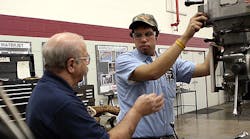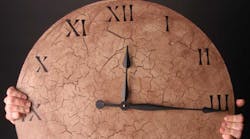John Galsworthy was a hugely successful writer in the early 20th century, though he is mostly forgotten now. Like many authors of his era, he portrayed people who thrived or suffered but never could overcome the social class that defined them. In The Skin Game he presents the story of a factory owner who is brought to grief by a family of aristocrats outraged that his business is growing in contrast to their beautiful but declining domains. They have a noble heritage, you see, and he is merely "middle class."
Editor-in-Chief
Originally, "middle class" meant no class at all, and for most of human history that was the problem. In Medieval Europe you either were upper class — secure in society, property holding, possibly titled, certainly entitled to many of the advantages that made life more enjoyable than laboring for your sustenance; or you were lower class — dependent, probably uneducated, without social connections, lacking in opportunity or mobility. Worst of all, the governments validated these rules. The laws enforced them and courts upheld them. Much blood was shed to preserve the system, and to end it.
For reasons too numerous and familiar to catalog, an alternative emerged late in the Middle Ages. People without titles or properties gained greater influence in their societies because of their skills —tradesmen, financiers, scholars, artists, professionals, and later manufacturers — and these changes coincided with other events, so that the assumptions and privileges of class designations had to allow for an alternative to "upper class" or "lower class."
That didn't mean the upper and lower classes welcomed these new arrivals, and the "middle class" label (among other epithets, e.g., arriviste, bourgeois, nouveau riche, parvenu) was used to denigrate their inconsequential families, their perceived deficiencies of social grace, and especially their determination to acquire greater wealth and influence.
Describing someone as middle class was a way to designate him as having no place in that society. But beyond Europe, where progress was given more relevance than history, relating property and heritage to privilege was pointless, and inefficient. Slavery and indentured servitude were tried, but they were intolerable by the new standards. Gaining wealth and growing it was the way to acquire influence, and so even without an upper class or lower class the attributes that first described the middle class proved to be means for success. Self-discipline, hard work, education, and thrift would lift someone out of poverty. Personal decency, modesty, respect for law and tradition would ensure security, and the esteem of one's fellow citizens.
These middle class traits are and always have been personal virtues, the attributes that lead to success. The middle class was defined by how it behaved, not how it lived. In the U.S., such good habits made middle class people prosperous, and numerous, and they helped to stabilize an industrial economy — so stable that employers found it helpful to reward employees with more wages and benefits, propagating more middle-class buyers for their products. Soon, the federal government had an interest in ensuring the permanence of this system, to maintain economic growth.
So, we have now the confusion that possessions and privileges define one as middle class: a car, a house, entertainment devices, or pension and health insurance plans. The needs grow and tastes change, so acquiring things becomes proof of one's standing. It's the functional equivalent of a social order where everyone's role must be defined and confirmed.
Within this order, the middle class virtues are degraded, too. Expectations of personal decency are low. Public morality is only nominally upheld and frequently challenged. Education emphasizes achievement over character development, and employment is considered a right, not an opportunity.
It is possible to find individuals working hard, living within their means, and foregoing rewards, though now the resentment toward such people is not because they are common but oddly because they're exceptional.
Today, "middle class" is considered an ennobling trait in the patronizing way that the establishment has always spoken of "the folks" they oversee. And the middle class cannot prosper, they warn; its security is precarious, and it needs greater assistance. They view middle class people as unable to motivate themselves or improve their prospects. To the ruling establishment we are not individuals, but a mass of needy innocents facing dire choices.
The transformation of "middle class" from an absence of privilege to an expectation of reward is more than a distortion: it's a complete reversal of the virtues that strengthened individuals to rise above their defined status and improve not just their own lives, but all humanity.










